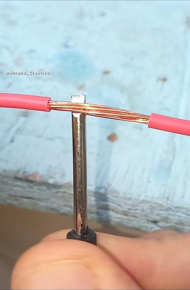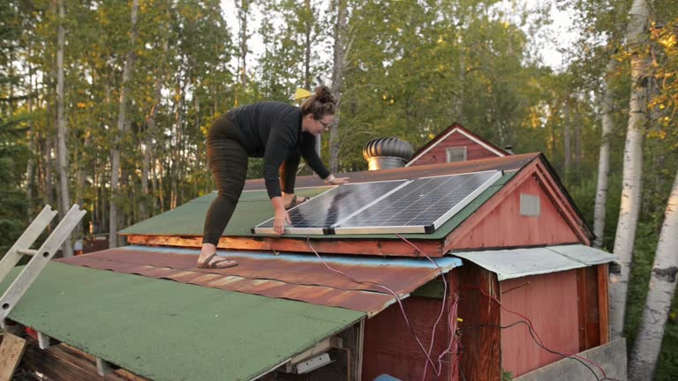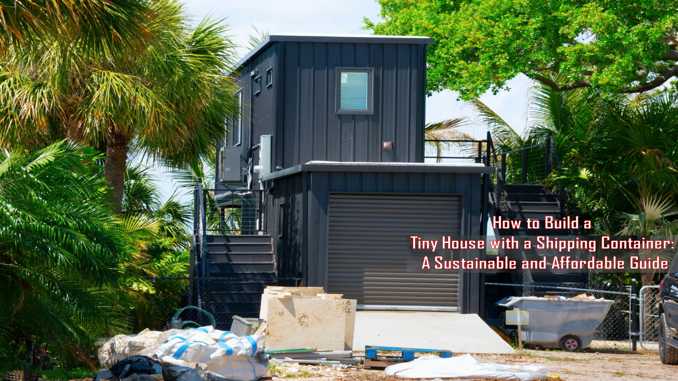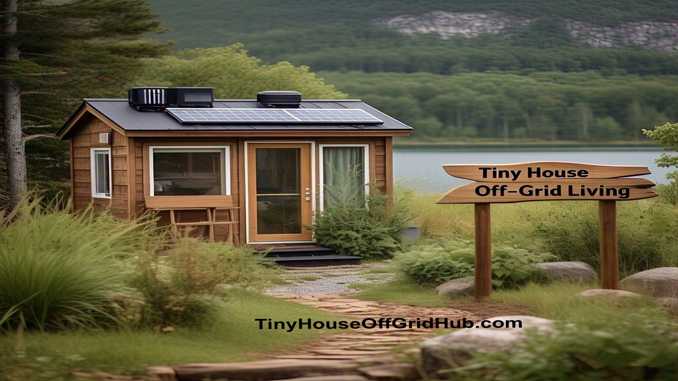Living in an off-grid tiny house needs a unique set of skills that go beyond traditional homeownership. These abilities are crucial for thriving in a compact, self-sufficient dwelling.
From basic maintenance to energy management and sustainable living practices, mastering these competencies will help you make the most of your off-grid tiny house experience.
Basic DIY and Maintenance Skills
One of the most crucial skill sets for off-grid tiny house dwellers is the ability to handle basic repairs and maintenance tasks. Your home’s compact size and unique systems mean you’ll need to be comfortable with a variety of DIY projects.
1. Carpentry and Woodworking
 In a tiny house, every inch counts, and the ability to create custom storage solutions or repair wooden structures is invaluable.
In a tiny house, every inch counts, and the ability to create custom storage solutions or repair wooden structures is invaluable.
Start by familiarizing yourself with basic woodworking tools and techniques.
Learn to use a circular saw, drill, and sander safely and effectively.
Practice measuring and cutting accurately to maximize material use.
Understanding different types of wood joints and their applications will prove useful as you tackle more complex projects.
As you become more comfortable with these skills, you’ll be able to build custom furniture or make structural repairs to your tiny house.
For example, you might create a fold-down desk that doubles as a dining table, or design a custom storage system that fits perfectly into an awkward corner.
These projects save space and allow you to personalize your tiny home to fit your specific needs and style.
2. Plumbing Basics
 Understanding the basics of your tiny house’s water system can save you time and money. Learn to identify and fix leaky faucets and pipes.
Understanding the basics of your tiny house’s water system can save you time and money. Learn to identify and fix leaky faucets and pipes.
This skill alone can prevent water waste and potential damage to your home.
Knowing how to unclog drains using natural methods or a plumber’s snake will keep your water flowing smoothly.
Familiarize yourself with your water filtration and storage systems.
Regular maintenance of these systems confirms clean, safe water for your daily needs. In cold climates, learning how to winterize your plumbing is essential to prevent freezing and potential pipe bursts.
Chelsea, an off-grid tiny house dweller in Colorado, shares her experience: “I once woke up to frozen pipes in the middle of winter.
After that scare, I made sure to learn proper winterization techniques. Now, I confidently prepare my plumbing system each fall, and I haven’t had any issues since.”
3. Electrical Know-How
 Living off-grid means being responsible for your own power generation and distribution.
Living off-grid means being responsible for your own power generation and distribution.
While you should always ask a professional for major electrical work, having a basic understanding of your electrical system is crucial for day-to-day living and troubleshooting.
Learn to read and understand your home’s electrical diagram. This knowledge will help you identify potential issues and talk effectively with professionals when needed.
Familiarize yourself with your solar panel system, including panel maintenance and battery care.
Regular cleaning of solar panels and proper battery maintenance can significantly extend the life of your system and improve its efficiency.
Know how to safely reset circuit breakers and replace fuses.
Understanding the basics of DC and AC power systems used in off-grid setups will help you manage your energy use more effectively and troubleshoot common issues.
Energy Management and Conservation
Living off-grid needs a keen awareness of your energy consumption and production.
Developing skills in energy management will help you maintain a comfortable lifestyle while minimizing your environmental impact.
4. Solar Power System Management
 If your tiny house relies on solar power, you’ll need to become adept at managing your solar energy system.
If your tiny house relies on solar power, you’ll need to become adept at managing your solar energy system.
Learn to monitor your battery charge levels and adjust usage accordingly.
This might mean scheduling energy-intensive tasks like laundry or using power tools during peak sunlight hours.
Understand how to improve panel placement for maximum sun exposure.
This could involve adjusting panel angles seasonally or trimming nearby vegetation that might cast shadows on your panels.
Develop a maintenance routine for cleaning panels and checking connections.
Regular cleaning can improve panel efficiency by up to 5%, which can make a significant difference in your overall energy production.
Know how to troubleshoot common solar system issues.
For example, if you notice a sudden drop in energy production, you should be able to check for loose connections, damaged panels, or issues with your charge controller.
5. Energy Auditing and Conservation
 Regularly assessing your energy usage and finding ways to reduce consumption is valuable for off-grid living.
Regularly assessing your energy usage and finding ways to reduce consumption is valuable for off-grid living.
Conduct energy audits to identify high-consumption appliances or activities.
This process might reveal surprising energy drains, like phantom loads from devices left plugged in when not in use.
Learn to use energy-efficient appliances and lighting. LED bulbs, for instance, use up to 75% less energy than traditional incandescent bulbs and last much longer.
When choosing appliances, look for Energy Star certified products that are designed to minimize energy consumption.
Develop habits that minimize unnecessary energy use.
This could include unplugging devices when not in use, using natural light whenever possible, and air-drying clothes instead of using an electric dryer.
Explore passive heating and cooling techniques to reduce reliance on powered climate control.
This might involve strategic window placement for cross-ventilation or using thermal mass materials to regulate indoor temperatures.
Water Management and Conservation
Water is a precious resource in off-grid living, and managing it effectively is crucial for sustainability and comfort.
Developing skills in water collection, purification, and conservation will ensure you have access to clean water while minimizing waste.
6. Rainwater Harvesting
 Learning to collect and use rainwater can significantly reduce your reliance on external water sources.
Learning to collect and use rainwater can significantly reduce your reliance on external water sources.
Understand how to design and install an effective rainwater collection system.
This involves more than just setting up gutters and barrels.
You’ll need to calculate your roof’s collection area, decide suitable storage capacity, and design a system that filters debris and contaminants.
Learn about proper filtration and purification methods for collected water.
Depending on your intended use, this might involve simple sediment filters or more complex UV sterilization systems.
Develop a maintenance routine for your rainwater harvesting system to ensure it operates efficiently and produces clean water.
Know how to calculate your water needs and storage capacity.
This will help you decide if your system can meet your household’s demands and plan for dry periods.
Wanda, an off-grid homesteader in Oregon, advises: “I track our water usage meticulously and always aim to have at least a month’s supply stored. It gives us peace of mind during dry summers.”
7. Greywater Systems
 Implementing a greywater system can help you maximize your water usage.
Implementing a greywater system can help you maximize your water usage.
Learn about different types of greywater systems and their applications.
A simple system might move water from your kitchen sink to water nearby plants, while a more complex setup could involve filtering and storing greywater for toilet flushing or irrigation.
Understand safe practices for using greywater in gardening or other applications.
Not all greywater is suitable for all uses, so it’s important to know which household water sources are safe for different purposes.
Know how to maintain and troubleshoot your greywater system to prevent clogs, odors, or potential health hazards.
8. Water Conservation Techniques
Developing habits and skills that minimize water waste is essential for off-grid living. Learn to fix leaks promptly and efficiently.
A small drip can waste gallons of water over time, so being able to replace a washer or tighten a connection can make a big difference.
Explore low-flow fixtures and appliances for your tiny house.
Low-flow showerheads, faucet aerators, and dual-flush toilets can significantly reduce water consumption without sacrificing functionality.
Develop water-saving habits in daily activities like washing dishes and personal hygiene.
For example, collecting water while waiting for the shower to warm up and using it to water plants or flush toilets.
Consider implementing a composting toilet to reduce water usage.
While it may seem daunting at first, many off-grid dwellers find that composting toilets are easy to maintain and significantly reduce their water needs.
Sustainable Food Production
Growing your own food can significantly enhance your off-grid lifestyle, providing fresh produce and reducing your reliance on external sources.
Even with limited space, you can develop a productive garden and preserve your harvest for year-round use.
9. Gardening Skills
 Even with limited space, you can develop a productive garden. Learn about container gardening and vertical growing techniques.
Even with limited space, you can develop a productive garden. Learn about container gardening and vertical growing techniques.
These methods allow you to maximize your growing space, even if you only have a small deck or patio.
Experiment with different container types and sizes to find what works best for various plants.
Understand companion planting to maximize yield in small spaces. Some plants grow better when paired with certain companions.
For example, planting basil near tomatoes can improve the flavor of the tomatoes and repel pests.
Develop skills in soil management and composting.
Healthy soil is the foundation of a productive garden, and composting allows you to turn kitchen scraps into nutrient-rich fertilizer.
Learn about season extension techniques like cold frames or small greenhouses.
These methods can help you grow food year-round, even in colder climates.
Gail, a tiny house gardener in Maine, shares: “My small greenhouse allows me to start seedlings early and extend my growing season by several weeks on both ends.
It’s made a huge difference in our food self-sufficiency.”
10. Food Preservation
 To make the most of your harvest, develop skills in food preservation. Learn canning techniques for fruits and vegetables.
To make the most of your harvest, develop skills in food preservation. Learn canning techniques for fruits and vegetables.
Proper canning confirms your produce stays safe and delicious for months.
Start with high-acid foods like tomatoes or jams, which are easier for beginners, before moving on to low-acid vegetables that need pressure canning.
Explore dehydration methods for long-term food storage. Dehydrating fruits, vegetables, and herbs is an energy-efficient way to preserve food that doesn’t need refrigeration.
It’s particularly useful for off-grid living where refrigerator space might be limited.
Understand fermentation processes for preserving foods and creating probiotic-rich dishes. Fermentation preserves food and enhances its nutritional value.
Start with simple projects like sauerkraut or yogurt before moving on to more complex ferments.
Learn about proper food storage to maximize shelf life.
This includes understanding which foods store well at room temperature, which need refrigeration, and how to create optimal storage conditions for different types of produce.
Adaptability and Problem-Solving
Perhaps the most important skill for off-grid tiny house living is the ability to adapt and solve problems creatively.
You’ll often face unique challenges that need innovative solutions.
Cultivating a mindset of resourcefulness and continuous learning will serve you well in your off-grid journey.
11. Resourcefulness
Develop the ability to make the most of what you have. Learn to repurpose and upcycle materials for various needs.
An old ladder might become a unique bookshelf, or a worn-out tire could be transformed into a planter.
This skill saves money and reduces waste and adds character to your tiny home.
Develop a network of like-minded people for skill-sharing and support.
Connecting with other off-grid dwellers can provide valuable insights, help with challenging projects, and offer emotional support when needed.
Cultivate a mindset of finding many uses for tools and resources.
In a tiny space, items that serve only one purpose quickly become burdensome.
12. Continuous Learning
Stay curious and open to learning new skills. Attend workshops or online courses related to off-grid living.
These can range from renewable energy seminars to wilderness first aid classes.
Each new skill you acquire makes you more self-reliant and better equipped to handle the challenges of off-grid living.
Read books and blogs about sustainable living and tiny house innovations.
The field of off-grid technology is constantly evolving, and staying informed about new developments can help you improve your systems and solve problems more effectively.
Connect with other off-grid dwellers to share experiences and knowledge.
Join online forums or local meetup groups to exchange ideas and learn from others’ successes and mistakes.
Every off-grid dweller has a unique set of experiences that can provide valuable lessons.
Living in an off-grid tiny house is a mission of continuous learning and adaptation.
By developing these essential skills, you’ll be well-equipped to handle the challenges and reap the rewards of this unique lifestyle.
The key to success comes from cultivating a mindset of resourcefulness, sustainability, and lifelong learning.
Embrace the adventure, and enjoy the freedom and self-sufficiency that comes with mastering off-grid tiny house living.
QUICK SUMMARY:
20 Essential Skills for Off-Grid Tiny House Living
-
Master basic carpentry and woodworking techniques.
Learn to use tools safely and effectively. Practice building custom storage solutions and furniture for your tiny space.
-
Develop plumbing repair and maintenance skills.
Learn to fix leaks, unclog drains, and winterize your system. Familiarize yourself with your water filtration and storage setup.
-
Acquire basic electrical knowledge for off-grid systems.
Understand your solar panel system and battery care. Learn to safely reset circuit breakers and replace fuses.
-
Implement energy auditing and conservation practices.
Regularly assess your energy usage and identify high-consumption areas. Develop habits to minimize unnecessary energy use.
-
Learn effective solar power system management.
Monitor battery charge levels and adjust usage accordingly. Develop a maintenance routine for cleaning panels and checking connections. -
Master rainwater harvesting techniques.
Design and install an effective collection system. Learn proper filtration and purification methods for collected water.
-
Implement and maintain a greywater system.
Understand safe practices for using greywater in various applications. Learn to troubleshoot common system issues.
-
Adopt water conservation habits and technologies.
Fix leaks promptly and use low-flow fixtures. Consider implementing a composting toilet to reduce water usage.
-
Develop container and vertical gardening skills.
Maximize your growing space with innovative techniques. Learn about companion planting to increase yields in small areas.
-
Master food preservation techniques.
Learn canning, dehydration, and fermentation methods. Understand proper food storage to maximize shelf life.
-
Cultivate adaptability and problem-solving skills.
Develop the ability to find creative solutions to unique challenges. Learn to repurpose and upcycle materials for various needs.
-
Create and maintain a skill-sharing network.
Connect with other off-grid dwellers to exchange knowledge and support. Attend workshops and courses to continually expand your skillset.
-
Learn seasonal preparedness strategies.
Anticipate and prepare for the unique challenges each season brings. Develop routines for maintaining your systems year-round.
-
Practice emotional resilience techniques.
Develop strategies for maintaining a positive mindset in isolation. Establish routines that provide structure and purpose to your days.
-
Embrace minimalism in your tiny house lifestyle.
Regularly assess your belongings and declutter ruthlessly. Learn to appreciate multi-functional items and creative storage solutions.
-
Master energy-efficient cooking methods.
Learn to use solar ovens, rocket stoves, and other choice cooking technologies. Develop meal planning skills to minimize energy use.
-
Acquire basic first aid and emergency preparedness skills.
Learn to handle common medical issues and stock a suitable first aid kit. Develop an emergency plan for various scenarios.
-
Implement effective waste management practices.
Learn composting techniques for organic waste. Develop strategies for reducing and recycling inorganic waste.
-
Master natural cleaning and household product creation.
Learn to make effective, eco-friendly cleaning solutions. Develop skills in creating household items like soaps and candles.
-
Develop skills in choice transportation methods.
Learn basic bicycle maintenance and repair. Consider mastering other off-grid transportation options like electric bikes or small boats.



